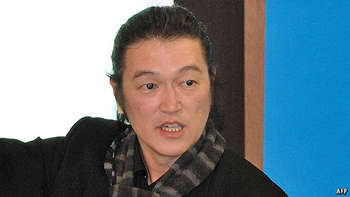日本とイスラム国ー苦い結末 [政治]
Japan and Islamic State
The bitter end
Japanese come face to face with terrorism at its most savage
(Economist 2015/02/02)

イスラム国に殺害された後藤健二さん
日本とイスラム国―痛々しい結末
― 最も残虐なテロリストと直面する日本ー
イギリスの経済誌エコノミスト2月2日号がイスラム国による日本人人質殺害事件についての記事を載せていますのでその記事をここに紹介します。
「日本国民の大半はテロリストによる暴力の脅威が出来るだけ早く収まることを望んでいる。
これまでテロの脅威の影響を直接受けることなく、イスラム国から遠く離れた島国に暮らす日本人は、湯川さん、後藤さんが殺害されてからイスラム国からの脅威にさらされていると身近に感じるようになった。
さらには湯川さんと後藤さんは自分から進んてそういった危険地域に出かけて行ってそのために同胞の身を危険にさらすことになったのだという自己責任まで飛び出すようになった。
安倍首相の強気の姿勢がイスラム国を挑発?
安倍首相は「日本政府は国際社会と連携してイスラム国に日本人人質殺害の罪を償わせる、日本はテロリストを決して許さない、テロリストの要求に屈したりはしない。」などと強気の姿勢を見せている。
事件の約2週間前、安倍首相は訪問先のエジプトでイスラム国と闘っている諸国に2億ドルの人道支援を行うと表明したが、イスラム国はこれと同額の身代金を日本政府に要求。
日本はテロリストとの対応能力が不十分なのにこうした安倍首相のテロに対する強気の姿勢が今回の悲劇を招いたのではとの声が出ている。
1月20日に後藤さん、湯川さんの殺害予告がなされてから、安倍首相が事件の対応で出来ることは極めて限られていて、日本政府は丸腰でテロリストと闘わなければならなかったとの声も聞こえている。
湯川さん、後藤さんの2人がどこにいるのかわかるような情報手段もなく、イスラム国との直接交渉も出来なかった。そして日本の平和憲法では自衛隊による海外での人質救出作戦は禁止されている。さらにはテロリストに身代金を支払えば同盟国であるアメリカを怒らせてしまうことにもなるとの懸念がある。
そうした事件の背景を受けて安倍首相はテロリストに対応できる強い日本を作ることを目指して、自衛隊の海外での活動範囲を広げたり、さらには戦争放棄を謳った憲法第9条の改正を目指している。
日本国民の反応
日本国民は今回のイスラム国の残虐の行為を目にして、日本国民に身の危険が及ぶことが現実問題としてとらえている。そしてテロリストの脅威にさらされない安全な場所である自分たちの狭い島国に閉じこもるようになり、日本人はますます孤立主義を貫くようになっていく。
そのため、安倍首相の長年の夢である平和主義からの脱却にブレーキがかかるのではとの声が出ている。
大半の日本国民は日本政府の安全保障政策の大幅な変革には反対なのである。
自衛隊法や憲法の改正などについて国民の理解が得られないまま事を進めていけば、安倍首相は今後難しい局面を迎えることになるだろう。
★テロリストの脅威に対して毅然とした態度で臨む安倍首相に国民の多くがある種の違和感を感じているのではないかというのがエコノミストの論調のようです。
軍事行動ではなく人道的支援活動なのだと説明したところで、イスラム国は聞く耳を持たず、結局は日本はイスラム国を攻撃するアメリカの手先だと見られているようです。
今回の事件のように海外でテロリストによる人質事件が発生しても、日本政府が直接手が下せない状況下ではテロリストの要求に翻弄されるだけのようです。
テロに屈しないための体制作りを急ぐ安倍首相ですが、果たして世論を味方につけることが出来るでしょうか。
THOUGH many had feared a tragic end to Japan’s two-week long hostage crisis, the video released by Islamic State (IS) on February 1st showing the brutal murder of Kenji Goto (pictured), a journalist and documentary maker, prompted shock, outrage and deep sorrow at home. Mr Goto’s work portraying the suffering of refugees and children in war zones had quickly won the nation’s respect. Japan was also left to digest the jihadist group’s chilling threat to kill more Japanese in an ongoing “nightmare” for the country.
Ordinary people wish the threat of violence would disappear as swiftly as it came. Living on a remote archipelago typically untouched by terrorism, office workers in central Tokyo now say that they feel personally vulnerable to IS after Mr Goto’s killing. The shock has even led some to blame the two hostages for venturing willingly into dangerous territory and, as they see it, endangering compatriots.
Shinzo Abe, the prime minister, struck an unusually forceful stance following the news, promising to work with other countries to “make IS atone for its crimes”. Japan would never forgive the group, he said, and never give in. It was a pledge by Mr Abe in Egypt nearly two weeks ago—to commit $200m in humanitarian assistance and infrastructure development in countries fighting IS—that prompted the jihadist group to demand an equal sum as ransom for Mr Goto and a second hostage, Haruna Yukawa. Mr Abe's assertive language came as a surprise to Middle East experts in Japan’s own diplomatic service.
It later emerged that the government had known that IS was holding the two men, and some critics have blamed Mr Abe for precipitating a crisis that the country was ill-equipped to handle. The affair could now affect his cherished mission to have Japan play a bigger part in the world. After IS’s initial threat to kill the hostages, on January 20th, Mr Abe’s options were quickly revealed as tightly circumscribed. Japan had no intelligence capability to discover the two men’s whereabouts, and it did not communicate directly with IS. The country’s pacifist constitution barred a rescue mission, and paying a ransom would have angered America, Japan’s main ally (although Japan has in the past paid ransoms).
Mr Yukawa’s plight evoked less public sympathy than that of his friend. He appeared something of a lost soul who travelled to Syria to find himself, only to be captured by IS, drawing in Mr Goto to seek his release. After news of Mr Yukawa’s execution came on January 24th, a new phase of the crisis unfolded as IS offered to free Mr Goto in return for the release of a female Iraqi suicide bomber held by Jordan. Yet Jordan reportedly rejected a straight swap and requested the additional release of a Jordanian fighter pilot held by IS, as well as proof that he was still alive. Japanese officials privately complained that they found themselves entirely reliant upon Jordan.
For now, Japan’s horror at IS’s brutality is trumping criticism of Mr Abe’s handling of the crisis. The tragedy underlined that Japan is obliged to fight “barehanded”, says Tomoyuki Abe, a 31-year-old salaryman in central Tokyo, echoing many politicians in Mr Abe’s Liberal Democratic Party. Indeed, his administration regards it as further persuasive evidence of the need for a beefed-up military. In the current session of the Diet, Mr Abe's government will submit legislation to allow its Self-Defence Forces to come to the aid of Japan’s allies should they come under attack—and in a way which endangers Japan’s own security.
The two hostages’ grisly fate could further entrench the public’s isolationist tendency, hindering Mr Abe’s dream of ditching pacifism altogether. A majority of Japanese are already opposed to his impending security changes. Convincing them otherwise probably just got harder still




コメント 0